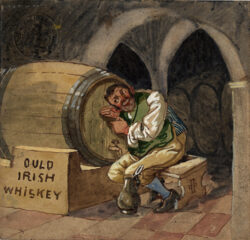Magazine
“Liquor Pang” by Galactic ft. Morning 40 Federation
A contemporary blues with a seductive absence of regret.
Published: August 30, 2018
Last Updated: December 3, 2018
“Liquor Pang,” a 2010 collaboration between Galactic and members of the Morning 40 Federation, is certainly not a New Orleans standard or recognized classic, but it should be. It’s a song about drinking and addiction, and, less directly, about the relationship between place and the struggle of a certain variety of sin.
New Orleans drinking songs are plentiful. You might benchmark this one to “I Got Loaded” by Lil Bob and the Lollipops, an unapologetic account of sense-obliterating drinking that technically originated elsewhere in Louisiana but has certainly been absorbed here by now as a fun barroom singalong, ironically or not.
People become problem drinkers everywhere; New Orleans has no monopoly on regrettable behavior. And yet. In the early 2000s, just after I moved here the first time, a visiting acquaintance told me about a friend who had come to the city and promptly spiraled into a life of reckless infidelity and substance abuse. Then he asked me, point blank, and with what seemed to be earnest concern: “How’s your moral compass?”
My third-favorite line in “Liquor Pang” is: “Can’t stay sane without some liquor and some cocaine.” It’s not so much the quality of the words that I enjoy, but the gusto with which they’re sung. The song has, to that point, described regrettable behavior (“making bad decisions with the money I earn”) and a distinct lack of moral discipline. But somehow this line arrives with the jubilant force of a stadium-rocking payoff, the moment when every listener explodes with physical joy.
I heard “Liquor Pang” when my wife and I were living in Savannah. Galactic and the Morning 40 Federation had each formed in New Orleans the 1990s. Galactic played virtuosic funk rock, building an audience on the jam-band circuit. The Morning 40s were a raw and reckless bar band whose “drunk rock” attracted a cult following.
We hadn’t particularly followed either band, but this song, we agreed, was perfection: a sonic banger, thoroughly modern but with a humid genuineness. Meticulously produced, like everything else on Galactic’s collaboration-loaded 2010 record Ya-Ka-May, it starts out as dirge driven by a spooky keyboard, then hits a series of guitar-and-horn-bomb crescendos. A contemporary blues with a seductive absence of regret, it sounded like something that could only have come from the New Orleans we missed.
We’ve since moved back, and once again I find myself explaining to visitors that the excesses of Bourbon Street are not a reflection of my city, per se. They are a reflection of what visitors do when they leave their “moral compass” next to their hotel-room Bible—and proceed to charge in precisely the “wrong direction” they came to New Orlearn to explore.
But still. Self-destructive sinfulness isn’t merely a commodity for sale in the Quarter. It’s a recurring theme in the biographies of the greatest creators in the city’s history, and probably not a few of its most upstanding citizens, and perhaps a fair chunk of the rank and file.
For most of us, things work out. We learn to suppress or at least navigate the pangs, move forward, grow up, live, progress. That, in fact, is the standard moral-compass narrative, here and everywhere: we resist this sensible change for a time, and make our mistakes, but we overcome that resistance, and find a way to be better. Change is the heart of redemption, and the essence of our moral, and spiritual, victory.
“Liquor Pang” addresses that idea—by completely reversing it. “I try to stay the same,” the singer confesses, with tangible sadness and regret, “but I know I change.” This is my favorite line in the song. For all the wrong reasons, it’s tragic. It makes me wonder if we ever really regret the sins we leave behind, or if we simply miss them.
Rob Walker (robwalker.net), whose books include Letters From New Orleans (2005), writes the Workologist column for The New York Times Sunday Business section. He is finishing a book about noticing and attention.
